These ten books resist tidy categorization, because it is not quite right to call them “memoir” when at their center they are works of art and scholarship, philosophical treatises and critiques. They are representations of the body, of types of bodies, of lacunae; they are bridges crossing a river of the unsaid to the archive. They exist in self-reflexive dialogues, they use language as a tool for invention, not to parrot the familiar.
Article continues after advertisement
Even in its least violent forms, discrimination on the basis of gender or sexuality is a violence of erasure, of not seeing as a form of denying a person their authentic existence. Keenly aware of that empty space, these ten writers write into it, unafraid, to give us these books that tell of transness, motherhood, domestic abuse, AIDS, loss, art-making, funerals, fish, and most of all: love.
Melissa Febos, Girlhood, 2021
Girlhood is a collection of eight essays that blends memoir, investigative reporting, history and cultural criticism. In the author’s note, Melissa Febos, American writer and professor and former professional dominatrix, writes that “by writing this book… I have corrected the story of my own girlhood and found ways to recover myself. I have found company in the stories of other women, and the revelation of all our ordinariness has itself been curative.”
She expertly combines the personal and the universal, the past and the present, in “a work that is both an exposé and a corrective, a memoir and a polemic” (The Washington Independent Review of Books). In the last essay, there are two Melissas, at present and 20 years ago. “The two Melissas, however, aren’t at odds with each other, but dear friends, whose ‘bodies curl in identical parentheses.’ The compassion Febos has discovered for her younger self is inspiring” (The New York Times Book Review).
“You, small animal in the pink dress from your abuela, dirty sneakers, bloody knees, looking up.”
National Book Critics Circle Award Winner • National Bestseller • Lambda Literary Award Finalist • One of the Best Books of the Year by Time • NPR • The Washington Post • Kirkus Reviews • and Others
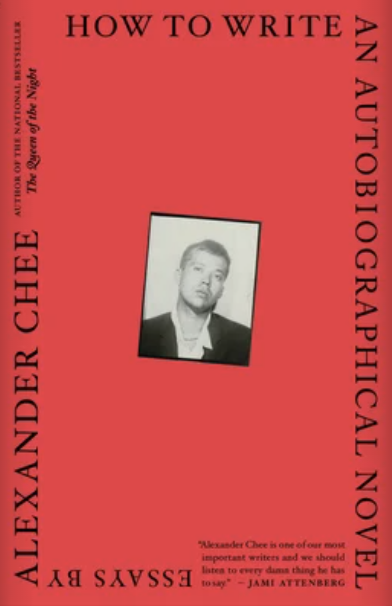
Alexander Chee, How to Write an Autobiographical Novel: Essays, 2018
“Few books fit the bill of ‘autobiographical novel’ better than this collection, which is arranged in rough coming-of-age chronology, from the author’s sexual awakening as an exchange student in Mexico (‘a summer of wanting impossible things’) to the death of his father at 43…The book ends with the beautiful sentiment…that a novel, ‘should it survive, protects what a missile can’t’” (New York Times Book Review). The writing in How to Write an Autobiographical Novel “has a mesmerizing quality; his sentences are rife with profound truths without lapsing into the didactic” (NPR). It is “a book that will leave you breathless, as much for its vulnerability as for its exquisite sentences” (Vox). Alexander Chee is a novelist, essayist and professor of English and Creative Writing at Dartmouth.
I like to believe, stupidly, that if I were to open the front door again, in the back I would find my roses, huge from their seaweed tea and the many days of six hours’ sunlight, perhaps growing legs, ready to push down the building and walk out to the street, striking cars out of the way and slicing the blacktop to ribbons.
Winner of the Publishing Triangle’s Randy Shilts Award for Gay Nonfiction • Lambda Literary Trustees’ Award • Finalist for the PEN/Diamonstein-Spielvogel Award for the Art of the Essay • Finalist for a Lambda Literary Award for Gay Memoir/Biography • Longlisted for the Carnegie Medal of Excellence in Nonfiction • One of the Best Books of the Year by New York Magazine • The Washington Post • Publisher’s Weekly • NPR • Time • and Others
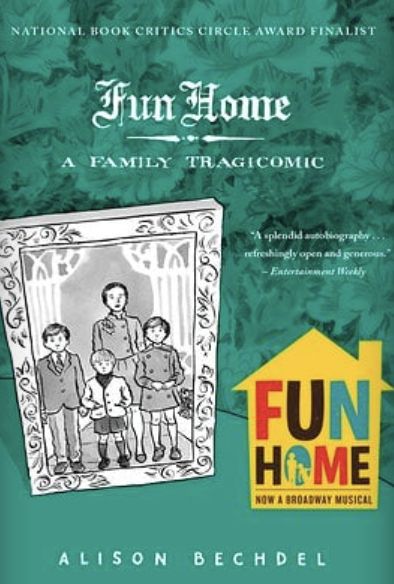
Alison Bechdel, Fun Home, 2006
Alison Bechdel’s “slim yet Proustian” Fun Home is a memoir as graphic novel, a twofold narrative of her coming-of-age as a lesbian and her fraught, but poignant, relationship with her father—who is “a barely closeted homosexual” whom she bonds with over a shared literary sensibility (Kirkus). But when he dies, soon after Alison comes out to him as a lesbian, she is left with a complicated aftermath. “Fun Home must be the most ingeniously compact, hyper-verbose example of autobiography to have been produced… pioneering” (New York Times Book Review). Alison Bechdel is an American cartoonist, originally known for the long-running comic strip Dykes to Watch Out For. “One of the best memoirs of the decade … at once hypercontrolled and utterly intimate” (New York Magazine).
“I suppose that a lifetime spent hiding one’s erotic truth could have a cumulative renunciatory effect. Sexual shame is in itself a kind of death.”
National Bestseller • One of the New York Times 100 Best Books of the 21st Century • Time Magazine #1 Book of the Year • National Book Critics Circle Award Finalist • Winner of the Stonewall Book Award • Double Finalist for the Lambda Book Award
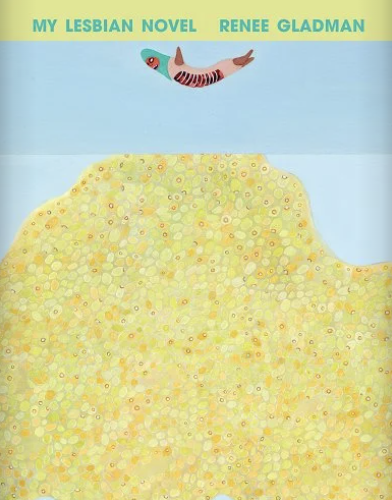
Renee Gladman, My Lesbian Novel, 2024
My Lesbian Novel is “a genre-bending celebration of lesbian desire that offers an innovative shape for queer romance, a craft lecture spooning its own novel” (The Rumpus). “My Lesbian Novel is a brilliant fusion of improvisational narrative and aesthetic treatise. It’s fiction and not”; the narrator of the book is named Renee Gladman, a writer and artist who has the same oeuvre as Renee Gladman, author (4Columns). Renee Gladman is a poet, novelist, essayist, and artist.
What results in My Lesbian Novel is a “beautifully orchestrated dialogue between reflection and desire, or clarity and confusion, between the pleasures of form and the pleasures of freedom in the unspooling of sentences over time” (NYRB). Much of the novel is told in interview format between an unnamed interviewer and Renee Gladman, protagonist of the book. “When we read a novel there’s no real record of the time in which it was written,” but this inventive book contains the record of its own making.
“So perplexing that we can look down and see our bodies; we see our arms and legs but never our faces.”
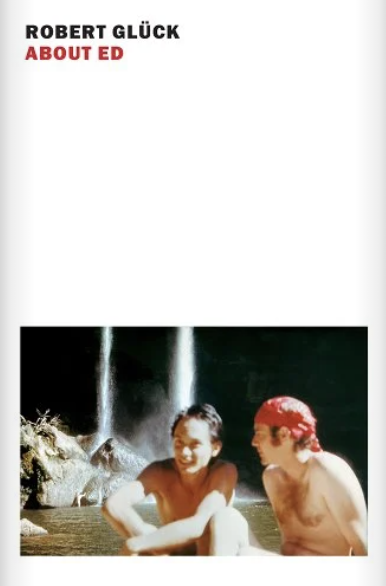
Robert Glück, About Ed, 2023
Robert Glück’s “About Ed is a literary monument that harnesses memoir’s emotional honesty while indulging fiction’s stylistic latitude” (The New Yorker). In 1970, Bob Glück met Ed in San Francisco; for the next eight years, they were lovers, then friends. In 1994, Ed died of HIV. The book is a hybrid of fiction and memoir—it is “about” Ed but it is about Bob, too—using “elements of Ed’s own journals and dream notebooks so that the work becomes a collaborative act” (E-Flux). “Glück rarely appears on the page but we feel him, like the shape of a bottle or an empty shell” (Los Angeles Review of Books). About Ed “interweaves elements of biography, memoir, psychotherapy, philosophy and confession” (The New York Times Book Review).
As with memoir, the book is a memorial, a memorial to Ed, to “his generation of gay men, many of whom lost their lives to AIDS,” and also to Bob, who writes, “I started this book two decades ago, so now it has turned into a ritual to prepare for death, and an obsession to put between death and myself.” Robert Glück is a poet, fiction writer, critic and editor.
“Nothing nothing nothing is more unlikely—not hell, or rising from the dead or bardo states, or the Isles of the Blessed—nothing is more fantastic than for someone you love to stop, just stop, and be lowered into a hole and covered with concrete and actual dirt.”
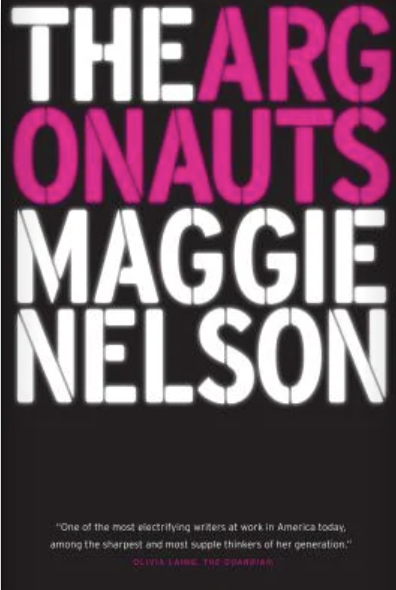
Maggie Nelson, The Argonauts, 2015
The Argonauts is part memoir, part philosophical theory, part critical inquiry—an “elegant, powerful, deeply discursive examination of gender, sexuality, queerness, pregnancy and motherhood, all conveyed in language that is intellectually potent and poetically expressive” (The Washington Post). Nelson, the poet and critic, is pregnant, at the same time that her partner, Harry Dodge, is starting testosterone injections, and she describes it as “the summer of our changing bodies,” wondering “whether there is ‘something inherently queer about pregnancy itself,’ and if the notion of the pregnant woman as the embodiment of convention ‘is just another disqualification of anything tied too closely to the female animal from the privileged term (in this case nonconformity, or radicality)’” (The New Yorker). Maggie Nelson, “the gifted critic and scholar breaks generic ground with her work of ‘auto theory, ‘ which offers a glimpse into the writer’s mind, body, and home” (Bustle).
“On the inside, we were two human animals undergoing transformations beside each other, bearing each other loose witness.”
Winner of the 2015 National Book Critics Circle Award in Criticism
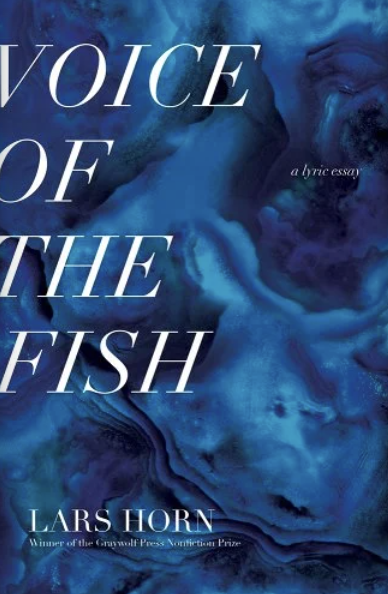
Lars Horn, Voice of the Fish: A Lyric Essay, 2022
Lars Horn’s Voice of the Fish is a book-length essay that combines memoir with “mythology, theology, and marine history to explore questions of the body—particularly, gender, sexuality, transmasculinity, and illness” (Graywolf Press). An injury left Horn unable to speak or read for months, “but living for six months in a body that wouldn’t adhere to words, that balked at sentences, made [them] aware of the body as texture.” And as the only child to an artist mother who had them pose ‘dead’ for photographs and installations, Horn “had endured such deathly stillness many times before.” “The body always adapts, the book argues,” “the body expanded beyond its periphery–animal, vegetable, mineral. Textural. Gestural.” (The New York Times, Horn). In Voice of the Fish, “the writing, sentence for sentence, is extraordinary” (Alexander Chee, author of How to Write an Autobiographical Novel). Larns Horn is a British writer and translator.
“The body was movement, volume, was rhythm through space. The body was not to be looked at. Except when that looking made it strange. When the stilling of a body undid it. Lent an enduring instability.”
2020 Graywolf Press Nonfiction Prize Winner
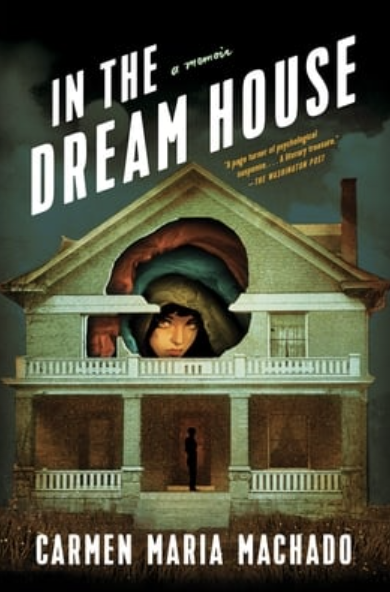
Carmen Maria Machado, In the Dream House, 2019
“Certain histories never enter the cultural record,” Carmen Maria Machado discovered. “Before she met her ex-girlfriend, [she] hadn’t encountered narratives of queer domestic abuse; she lacked context and precedents; she could not make sense of her experience” (The New Yorker). So, short story author, essayist and critic, Carmen Maria Machado wrote In The Dream House, a memoir that “takes a breathtakingly inventive form.”
Each chapter changes forms and narrative modes to circle again around the central question: how to represent queer domestic abuse, how to construct and deconstruct this ‘Dream House,’ a house which is many things all at once. “Merge the house and the woman—watch the woman experience her own body as a haunted house, a place of sudden, inexplicable terrors—and you are reading the blazingly talented Carmen Maria Machado” (Parul Sehgal, The New York Times).
And then it occurs to you one day, standing in the living room, that you are this house’s ghost: you are the one wandering from room to room with no purpose, gaping at the moving boxes that are never unpacked, never certain what you’re supposed to do. After all, you don’t need to die to leave a mark of psychic pain. If anyone is living in the Dream House now, he or she might be seeing the echo of you.
2019 Bisexual Book Award • 2020 Judy Grahn Award • 2020 Lambda Literary Award for Nonfiction • 2021 Rathbones Folio Prize • Longlisted for the 2020 Andrew Carnegie Medal for Excellence in Nonfiction
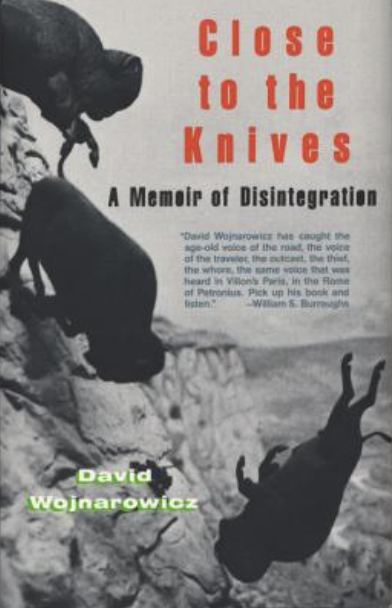
David Wojnarowicz, Close to the Knives: A Memoir of Disintegration, 1991
David Wojnarowicz was an American painter, photographer, writer, filmmaker, performance artist, songwriter/recording artist, and AIDS activist, who was a vital part of the East Village art scene of the 1980s. He died of AIDS in 1992. Close to the Knives is a memoir composed of essays, “a memoir of disintegration, he called it, alluding both to its chopped up, collaged structure and to the landscape it maps: a place of loss and danger, of transient beauty and dogged resistance” (The Guardian). Wojnarowicz writes about his violent childhood in suburbia to his homelessness in New York City, about AIDS, loss, drugs, politics, family, art.
“This work of hard-living autobiography is written in a flood of run-on sentences, and in a tone of almost hallucinatory incandescence” (New York Times, 50 Best Memoirs of the Past 50 Years). Close to the Knives is an “intensely alive hybrid: a work of radical honesty that uses the most intimate of experiences, particularly sexual, as a way of prying open the devastating way in which political systems work to exclude and silence the unwanted” (The Guardian).
“I felt my body thrumming with the sounds of vessels of blood and muscles contracting the sounds of aging and of disintegration–the sound of something made ridiculous with language–the sense of loving and the sense of fear.”
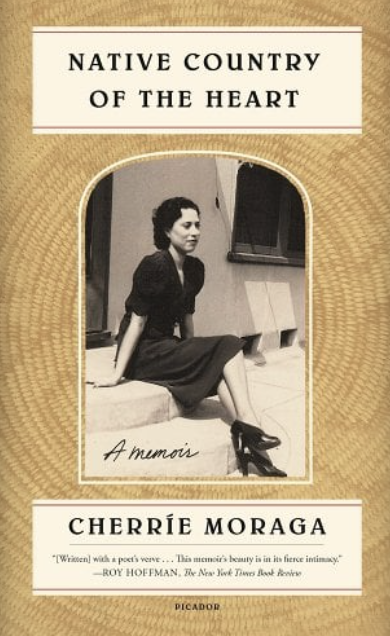
Cherrié Moraga, Native Country of the Heart, 2019
Native Country of the Heart “is a masterpiece of literary art” (Los Angeles Review of Books). It is a hybrid memoir and biography of her mother, Elvira, that Moraga sees, instead, as neither memoir nor biography, but as “a portrait of a relationship… a map of the critical moments in my mother’s and my shared lives… a chronicle of desire.” Native Country of the Heart is a Mexican American coming-of-age that explores the nature of memory and of archive, it is a “poetic but searing narrative paint[ing] a brilliant portrait of the painful complexities of race, class, and family mysteries” (LARB). Cherrié Moraga is an influential Chicana feminist writer, activist, poet, essayist, and playwright. “[Written] with a poet’s verve…bThis memoir’s beauty is in its fierce intimacy” (The New York Times Book Review).
“I had only one romance–the love of an intractable Elvira, and this is what would shape my lesbianism and this is what would mark my road as a Mexican and this is what would require me to remember before and beyond my mother.”
One of Literary Hub’s Most Anticipated Books of 2019
